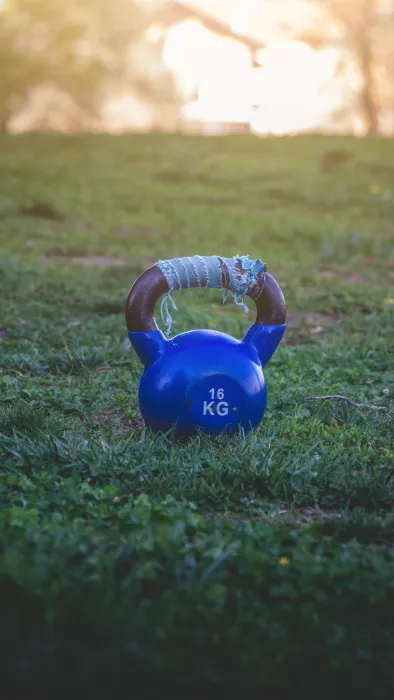A Comprehensive Guide to Kettlebell Flow

-
The Role of Neuromuscular Coordination
-
Kettlebell Flow and Metabolic Conditioning
-
Building Functional Strength with Kettlebell Flow
-
Modifying for Beginners
- A Beginner's Kettlebell Flow
-
Advanced Kettlebell Flow
- An Advanced Kettlebell Flow
-
The Zen of Kettlebell Flow
-
The Power of Breath in Kettlebell Flow
-
Building Body Awareness with Kettlebell Flow
Exercise science is an ever-evolving field, and it's been giving the nod to the kettlebell flow. You might ask, "Why so?" Well, there's a reason, and it's not all smoke and mirrors.
The Role of Neuromuscular Coordination
One of the coolest things about the kettlebell flow is how it sharpens your neuromuscular coordination. That's a fancy way of saying it helps your brain and muscles work together more efficiently. This can improve your athletic performance and make everyday movements easier. It's a no-brainer, right?
Kettlebell Flow and Metabolic Conditioning
The kettlebell flow isn't just a strength workout. It's also a form of metabolic conditioning, meaning it increases your body's efficiency in consuming, distributing, and utilizing energy. The result? Improved cardiovascular fitness and calorie-burning potential. Talk about a win-win!
Building Functional Strength with Kettlebell Flow
The kettlebell flow doesn't just build muscle; it builds functional strength. This is the kind of strength that makes everyday activities easier, from carrying groceries to playing with your kids. It's all about making your life easier, and who doesn't want that?
Customizing Your Kettlebell Flow
The beauty of the kettlebell flow is its flexibility. You can customize it to suit your fitness level, goals, and even your mood! Let's dive into some ways you can make the kettlebell flow your own.
Modifying for Beginners
If you're new to the kettlebell flow, don't sweat it. You can modify the exercises to suit your fitness level. Start with lighter weights and simpler movements, and gradually increase the complexity as you get stronger. Remember, Rome wasn't built in a day!
A Beginner's Kettlebell Flow
Here's a simple kettlebell flow that's perfect for beginners:
Deadlift
High Pull
Goblet Squat
Push Press
Bent Over Row
Perform each exercise for 30 seconds, rest for 15 seconds, then move to the next exercise. Repeat the cycle three times.
Advanced Kettlebell Flow
Feeling confident? Ready to challenge yourself? An advanced kettlebell flow might be just what you need. These workouts include complex movements that engage multiple muscle groups and demand a high level of coordination and strength.
An Advanced Kettlebell Flow
Here's an example of an advanced kettlebell flow:
One-Arm Swing
Clean
Snatch
Windmill
Turkish Get-Up
Perform each exercise for 45 seconds, rest for 15 seconds, then move to the next exercise. Repeat the cycle three times.
Kettlebell Flow and Mindfulness
You may be wondering, "What on earth does kettlebell flow have to do with mindfulness?" Well, let me tell you, it's a match made in heaven.
The Zen of Kettlebell Flow
Just like a traditional Zen practice, the kettlebell flow demands your full attention. The complex, fluid movements require a level of concentration that can help clear your mind and bring you into the present moment. It's like meditation, but with a lot more sweat!
The Power of Breath in Kettlebell Flow
One of the most essential components of a successful kettlebell flow is breath control. Just like in yoga or pilates, coordinating your breath with your movements can enhance your performance and make the workout feel more fluid and natural.
Building Body Awareness with Kettlebell Flow
Kettlebell flow isn't just about building muscles or burning calories; it's also about building body awareness. By focusing on the intricate movements of the kettlebell flow, you can develop a deeper understanding of how your body moves and functions.
Common FAQs about the Kettlebell Flow
Let's address some common questions about the kettlebell flow. internet for some common FAQs about kettlebell flow to include in the article.
Where do I grip the kettlebell?
Your grip depends on the lift. For kettlebell swings, grip the bell comfortably in the center of the handle. For kettlebell cleans, snatches, or Turkish get-ups, use an off-set grip1.
How tight should my grip be?
At the top of a swing, you should be able to lightly flutter your fingers off of the bell. An iron grip can cause unnecessary tension up your forearms and through your elbow, so keep it firm but soft1.
What do my elbows do during kettlebell swings?
Your elbows should be firm but soft. Avoid keeping your arms locked out, and remember that the swinging motion should come primarily from your hips. Your arms are just levers to propel the weight along its path1.
How do I avoid hitting my crotch during kettlebell swings?
Ensure the swing is coming from your hips. Imagine your hip as a hinge connecting your upper and lower body. Your forearms should touch your upper inner thighs at the lowest part of your swing, providing enough clearance to avoid any painful encounters with the bell1.
Why are kettlebell cleans painful for my forearms?
They shouldn't be. If your kettlebell cleans or snatches are causing pain, it's likely due to improper technique. Making adjustments to your form can help alleviate this discomfort1.
Conclusion
In the realm of fitness, the kettlebell flow stands out as a versatile, full-body workout that can be tailored to your specific needs. Its graceful transitions, fluid movements, and the sheer variety of exercises it encompasses make it an excellent choice for anyone looking to break a sweat and get stronger. So, why not give it a go? Remember, fitness is a journey, not a destination. So, keep flowing and keep growing!
-
The Role of Neuromuscular Coordination
-
Kettlebell Flow and Metabolic Conditioning
-
Building Functional Strength with Kettlebell Flow
-
Modifying for Beginners
- A Beginner's Kettlebell Flow
-
Advanced Kettlebell Flow
- An Advanced Kettlebell Flow
-
The Zen of Kettlebell Flow
-
The Power of Breath in Kettlebell Flow
-
Building Body Awareness with Kettlebell Flow
